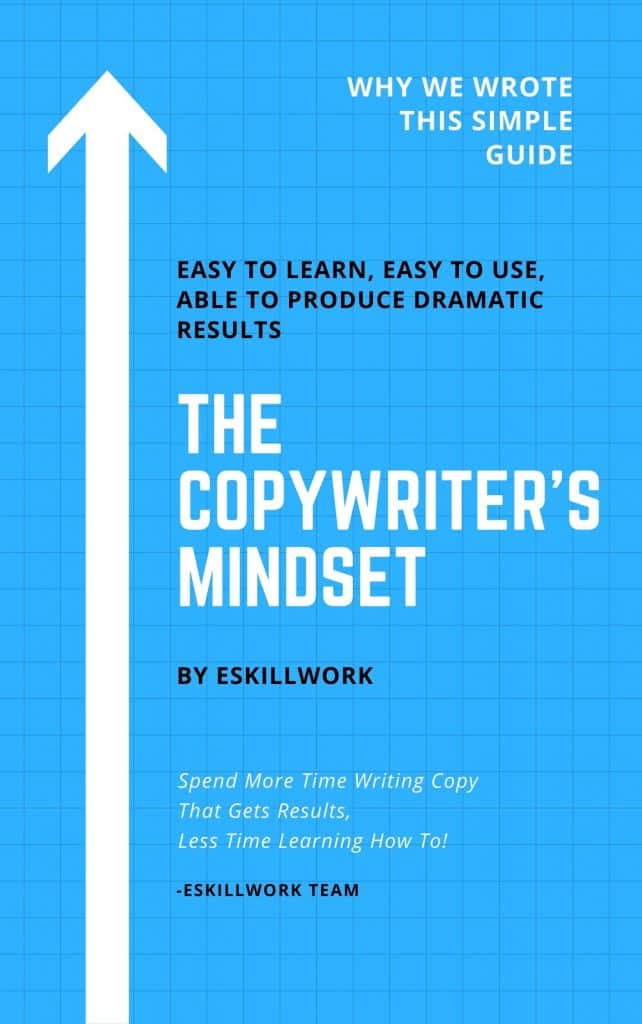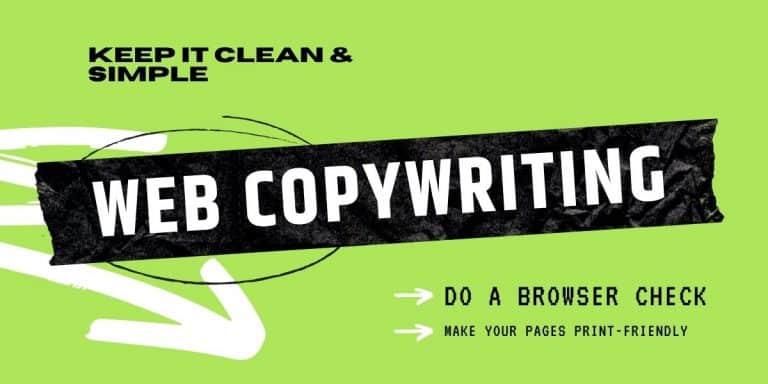Before You Start Copywriting
Collect Information
Do Your Research
Appreciate The Importance Of Good Research – Research gives you focus and clarity about the project you’re working on – it helps you fill the gaps of your knowledge, which is essential for doing a quality, efficient job.
Research Your Product – Discover:
| What’s it made of? Why was it created? When was it discovered? Who discovered it? What’s it based on? How is it made? |
Get It Straight From The Horses Mouth – Talk to the person who created the product – the founder, developer, or whoever it may be. Ask them lots of well thought-out questions, and listen closely to their answers, and take plenty of notes.
Try It First-Hand – Ask for samples of the product, so you and others can try it out. This will help you internalize the need for the product, as well as its benefits.
Research The Company – Find out as much as you can about the company that creates the product you’re promoting. What’s their mission statement, achievements, and history?
Ask For Existing Marketing Materials – Study past promotions, both those that worked, and those that didn’t. Try to figure out the emotions, words, and images that made one promo work and the other not.
Ask For Testimonials – Study testimonials and try to figure out the core benefits and emotions that the majority of users are expressing their feelings about. This will provide valuable insight into the approach you should take with your writing. Some may even provide inspiration for your main headline.
Study The Competition’s Marketing Materials – Successful competitors usually have successful promotions. Look them over to determine what elements stand out and seem to work well.
Go Online – Fire up your browser and gather facts, statistics, and interesting stories about the product, the company that makes it, or the industry that the product targets. For example, if the product targets people interested in green living, search Google for green living facts, green living statistics, or green living forums to see what sorts of things people are discussing that might prove helpful in your writing.
Get The Price – Of course, it’s necessary to know the price of the product before you begin writing your copy, but dig deeper and find out the reasons behind the price being what it is. What are others charging for something similar, and what went into creating the product that justifies the price?
Discover Objections – Ask for a list of objections about the product that have been expressed in the past. It’s crucial that your copy addresses each of the one’s that are commonly used.
Determine Your Copy’s Purpose
Determine Your Copy’s Purpose – Is it to:
| Get the reader to purchase today? Get the reader to enter their email address? Get the reader to request more information? |
Focus On Your Purpose – Once you’ve determined the purpose of your copy, be sure to focus your overall approach (the things you write, your testimonials, graphics, etc.) on accomplishing that one thing.
Get Your Client Involved
Agree On A USP – A product’s unique value to the reader (USP) is essential for providing guidance on how the copy should be written. Don’t wait until you’ve spent a lot of time writing your copy before getting input about the USP from the client. They may point you in a totally different direction than what you expected, causing a lot of wasted time and money.
Agree On A Sales Message – Before writing, share with the client the approach you intend to take with your copy. Get their feedback, or at the very least, check to see if it excites them and they’re on board with it.
Put Together A Bio – Get information about your client’s experience, accreditation, awards, and all other accolades. Not only will this be helpful as you craft your copy, but it prevent you from bothering them with related questions down the road.
Discover Their WHY – Have your client describe the benefits of their product in as much detail as they possibly can. Ask them who they think their market is, and why.
Develop Your Unique Selling Proposition – USP

Identify What Makes Your Product Different – How is the product:
| Unique Easier to use Simpler More efficient Cheaper Smaller Faster More visually appealing A better value A better design More durable More available More widely accepted More comprehensive More time-tested Of higher quality Cutting-edge Patented |
Follow These Guidelines – An effective USP is:
| Short – The fewer the words, the better. Positive – Saying, “We’ve never made a customer mad” might convey good customer service, but in a negative way. Find a positive way to state the same thing. Centered Around An Emotional Benefit – “You get younger-looking skin” is better than “It moisturizes your skin.” Memorable – “Just do it” Original – Things such as a low price, great service, and 50 years in business are all overdone, boring, and ineffective. You sometimes have to put a new twist on old ideas. |
Prove It – Use statistics, testimonials, and charts to provide proof that you can deliver on your USP.
Deliver It – Only make a promise in your USP if you can deliver it!
Make Good Use Of Your USP – Reinforce the main idea behind your USP throughout your copy.
Related Searches:
creating a usp – Videos
usp tips – Videos

Spend More Time Writing Copy That Gets Results, Less Time Learning How To!
Easy to learn, Easy to use, Able to produce dramatic results
Get To Know Your Reader
Bridge The Gap – You must bridge the gap between what the reader already knows, and what’s new to them (what you’re offering them). To bridge the gap, you have to know what your reader already knows.
Become The Reader – Sit quietly and imagine yourself as the reader – get into their skin and answer these questions:
| What is their mindset? The who’s, what’s, where’s, when’s, and why’s? What are their fears and joys? What are their wants and issues? Where do they live? What products, especially related products, have they purchased in the past? What year were they born, when did they go through high school? What cultural references are they familiar with (including events, fads, people, music, etc.)? What are their beliefs, values, and traditions? What is their income? Is it fixed, seasonal, going up, going down? What is their mental and emotional state? What kinds of ‘movies’ play in their head about their life, abilities, reputation, and self-worth? What is their predisposition (willing to listen or very skeptical), expectations, mood (happy, tired, or frustrated), and environment (home or work) the moment they encounter your marketing message. Are they sick of the same old marketing tactics? What’s the conversation going on in their head about the problem your product will solve? |
Related Searches:
personality traits list
personality traits of women
personality traits of men
Prepare To Write: Establish A Routine
Write On Schedule – Set aside a specific time each day to write.
Write In 30 Minute Blocks – Use a timer and block out at least 30 minute sections where you’ll do nothing but write. Don’t let anything break your flow, including bathroom breaks, getting a drink, eating…NOTHING! Try to fit at least 6 of these into your day.
Write At Your Peak – Make sure you write during your peak creativity period, whether that’s in the morning, afternoon, or night.
Write Every Day – You’ve got to be consistent with your writing. You’ll accomplish more by writing 10 minutes a day than you will writing 8 hours once every couple weeks.
Prepare For Tomorrow, Today – Before ending your day, make a list of things you want to accomplish tomorrow. Then, gather everything together that you need make it happen. Putting things in place ahead of time will increase your chances of getting them done!
Use Personal Deadlines – Set personal deadlines that are within the deadlines set by clients. Get projects done before they have to be done.
Related Searches:
writing routine
Prepare To Write: Get Into The Flow
Eliminate Distractions – Turn off all electronic distractions while you write – phone, email, instant messaging applications, and browser windows.
Related Searches:
eliminate distractions
Write, Write, Write – Get into a flow of writing without stopping or judging what you’re writing, or worrying about grammar, formatting, or adding slick copywriting techniques. Writing in a flow like this will provide a priceless number of ideas to select and build upon.
Talk & Record – Start talking about your product or service and record your ideas and thoughts into a voice recorder. Use these for inspiration when creating your copy.
Related Searches:
voice recorder – Shopping
voice recorder reviews
Use Flow To Achieve One Voice – Try to write as much as you can in a single sitting. This allows you to easily maintain the same voice and attitude throughout your copy.
Prepare To Write: Organize Your Work Area
Keep It Clean & Uncluttered – Keep your work area, especially your desk, clear of stacks of papers and magazines, used dishes, knick-knacks, batteries, or anything else that doesn’t need to be there for you to write and take care of your daily tasks. Don’t allow your desk to become a catch-all location for ‘stuff.’ Whether you know it or not, physical clutter that you see is a constant reminder of tasks that are left undone, and it becomes a constant mental distraction.
Related Searches:
unclutter your desk
Maintain An Orderly Desk – Establish a single location to store pens and pencils, post-it notes, or any other items you use regularly, and always keep them there.
Related Searches:
organize your desk
Get A Nice Chair – Writing for hours usually requires sitting for hours. You should get the most comfortable chair you can afford. For something new, go to Google and do a search for computer chairs. For something used and inexpensive, go to www.craigslist.org to search for computer chairs for sale in your area.
Keep A Notepad Handy – You never know when a great idea will hit you. Always keep a notepad within reach so you can quickly capture ideas that come to you. Then, immediately get back to what you were doing.
Eliminate Background Distractions – Don’t fool yourself into thinking that a TV on in the background, or your neighbors barking dog, will not affect your writing…they will! Turn off the TV, get earplugs, and do whatever else you can do to quiet the world around you so you can focus on writing great copy!
Related Searches:
earplugs – Shopping
stop your neighbor’s dog from barking
Prepare To Write: Maintain Your Computer
Defragment Regularly – Defragmenting your computer’s hard drive is similar to organizing files in a file cabinet, so you can find and use them more efficiently. If you don’t take care of this step (especially on a computer running Microsoft Windows), your computer can begin to slow down over time. Windows has a built-in disk defragmenter, which does a sufficient job, but for best results, use a 3rd-party tool (look for suggestions below).
Related Searches:
how to defragment your computer – Videos
disk defragmenter download
disk defragmenter reviews – Videos
Maintain Virus Protection – A single virus can bring down your computer, and can bring it down for good. If your computer is at the core of your business, this could result in some pretty substantial losses. DO NOT neglect using antivirus software! If you’re using Microsoft Windows, I recommend their excellent antivirus tool, which you can find by doing a Google search for microsoft security essentials.
Related Searches:
microsoft security essentials – Videos
antivirus software – Shopping
free antivirus software
antivirus software reviews – Videos
Backup Regularly – Hard drives crash, and with a nasty crash, there go all your files! It’s crucial that you’re always prepared for this possibility by regularly backing up your hard drive. This usually requires having a second (sometimes external) drive, and a piece of software that automatically, and regularly copies files from your main hard drive to your second one.
Related Searches:
how to back up computer – Videos
backup software – Videos
online backup – Videos
backup software review – Videos
external hard drive – Shopping
external hard drive review
Get Rid Of Unused Stuff – Over time, you add things to your computer that you end up no longer needing or using. These unwanted items clutter up your hard drive, your computer’s desktop, and sometimes use up your computer’s resources (especially memory) without you knowing it. At least once a month, remove unused shortcuts from your desktop, and uninstall software you no longer use.
Related Searches:
how to uninstall software – Videos
Clean The Mouse & Keyboard – Germs and filth that build up on your keyboard and mouse could make you sick, which brings a halt to your productivity. Schedule a regular time each month to clean these parts of your computer, to give yourself a better chance of staying healthy.
Related Searches:
how to clean your keyboard – Videos
how to clean your mouse – Videos
how to clean your monitor – Videos
clean your laptop – Videos
Related Searches:
maintain your computer – Videos
speed up your computer – Videos

Spend More Time Writing Copy That Gets Results, Less Time Learning How To!
Easy to learn, Easy to use, Able to produce dramatic results
Prepare To Write: Maintain Your Health
Plan For Sleep – Writing good copy requires a clear head. Get plenty of rest before writing copy, and save staying up late for some other time.
Related Searches:
sleeping tips – Videos
how to sleep better – Videos
Eat The Right Food – Avoid sugar or fat-laden foods and drinks before writing copy. It’s better to stick with fruits, teas, and good ol’ water.
Related Searches:
how to eat for energy
Start Your Day Early – Starting your day early in the morning allows you to work when things are usually the quietest, and if you take advantage of it, you can feel the incredible satisfaction that comes by accomplishing more by noon than most people do all day!
Really Enjoy Yourself Regularly – Take plenty of time AWAY from work to have fun and enjoy quality time with your friends and family. Contrary to popular belief, regular periods of rest and recreation contribute more to being productive than if you simply work all the time.
Get Moving – Start a simple exercise program. Even walking on a treadmill for 5 minutes a day can result in a decent increase of energy and clarity that will help you in the writing process (always consult your physician).
Related Searches:
simple | easy | creative ways to exercise
desk exercises – Videos
Practice Deep Breathing – Get into the habit of taking several slow, deep breaths of fresh air before you begin writing. Oxygen will help you think more clearly.
Related Searches:
deep breathing exercises – Videos
Put Yourself In A Positive State – Put yourself in a peak positive state by focusing on something positive that you absolutely love or look forward to doing – get excited about it! Jump up and down if you want! Or stand up, take several deep breaths and say ‘YES!’ several times with enthusiasm and power. Watching something funny can also be a great way to put you in a positive state for maximum creativity.
Take A Break Occasionally – Take at least a 5 minute break for every 30 minutes of work. Spend that 5 minutes thinking about anything (your upcoming vacation, how much fun you had over the weekend, etc.) other than your work.
Prepare To Write: Create An Outline
Start With An Outline – Use an outline tool or mind map to create a ‘skeleton’ of the overall direction you want to take with your copy, then go back and add some muscle to it! Your outline should contain sections for these basic elements:
| Headline Subheadlines Bullets Testimonials Guarantee Call to action Disclaimers |
Related Searches:
outliner software – Shopping
mind mapping software – Shopping
what is mind mapping – Images, Videos
Build Out Your Outline – Attach relevant ideas and research to appropriate areas of your outline as you come across them.
Tackle One Section At A Time – Once your outline is complete, set aside a specific block of time to work on each section of it. This will provide you with a useful schedule to reference to make sure you’re on-track to hit your overall project deadline.






